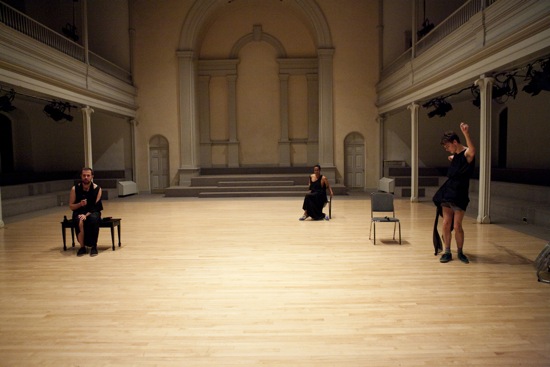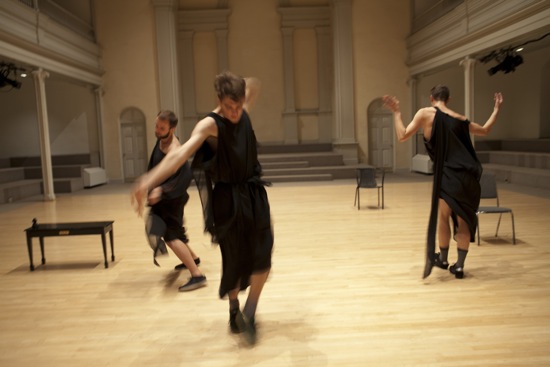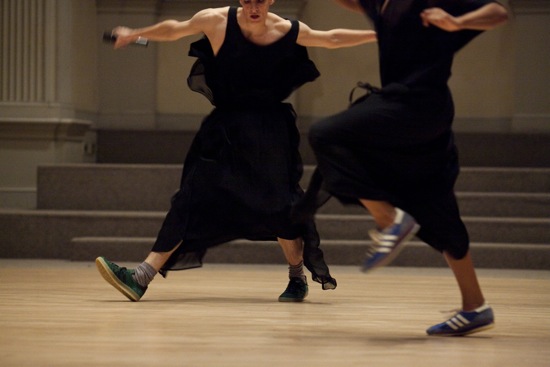
L to R: Andrej Vidlar, Trajal Harrell, and Thibault Lac rehearsing Harrell’s Judson Church is Ringing in Harlem (Made to Measure)/Twenty Looks or Paris is Burning at the Judson Church (M2M). Photo: Miana Jun Thxo
Judson Church is Ringing in Harlem (Made to Measure)/Twenty Looks or Paris is Burning at the Judson Church (M2M) may be the longest title in Trajal Harrell’s series of works titled Twenty Looks or Paris is Burning at the Judson Church. (As you will note, it results in a sentence that’s practically a runway.) In keeping with the fashion references that are integral to the idea, Harrell labels each piece by size—beginning with extra small. He’s made six so far, and the seventh and last is to be a book. Fans in Japan, Brazil, Canada, and numerous European cities, as well as ones in the U.S., are going to be very sad that M2M is the opus’s swan song in terms of performance.
Let me append some labels of my own: D (delicious), W (witty), P (provocative), B (brilliant).
M2M, fittingly, made its debut in St. Mark’s Church as part of Danspace’s Platform 2012: Judson Now, which celebrates the 50th anniversary of the radical and influential Judson Dance Theater. Harrell’s series hinges on a premise: “What would have happened in 1963 if someone from the voguing-ball scene in Harlem had come downtown to perform alongside the early postmoderns at Judson Church?” What it means in terms of Harrell’s works is that he has been able to imagine how full-out dancing, glamor, narrative, and emotion might resurface within a climate that celebrated everyday movement and a neutral performing style in brainy structures and plain-jane settings.
For M2M, he switches his original question around. What would have happened if one of those downtown adventurers (Yvonne Rainer, say) had gone up to Harlem in 1963 to perform in the voguing ballroom scene? And he answers that question ingeniously. Minimal movements stretched out over time, barely audible snippets of spoken text, a lot of repetition? OK, but take that up to Harlem and right away, the climate change begins to have an impact.
There are three magnificent performers in M2M, all men: Harrell, Thibault Lac, and Rob Fordeyn the night I attended (Ondrej Vidlar performed October 11 and 13, Fordeyn on October 12). They spend the first part of the piece either sitting on three chairs set at some distance from one another or walking between them.
They have not, however, come to the party clad in any-old attire, and they’ve taken the time to paint their toenails. Lac and Fordeyn wear draped, vaguely Grecian gowns constructed of a filmy black material (costumes by Complexgeometries), while Harrell’s dress, made of the same fabric, looks a bit more like something a grieving widow or an uncertain visitor might wear. (Watching the men sit, I imagine another question for the occasion: “What if Isadora Duncan’s adopted daughters had come to mourn (retrospectively) the early death of Chopin and been intimidated by all that stained glass?”).

L to R: Vidlar, Lac, and Fordeyn (the cast that never was?) rehearsing in St.Mark’s Church. Photo: Miana Jun Thxo
So, yes, they sit, looking lovely, making barely audible remarks now and then; quiet music with a beat hovers in the background. They all have microphones, but don’t always use them. I hear what could be song lyrics, place names, allusions to oppression. Harrell sings more powerfully, almost wailing. Slouching in his chair, he’s less contained than the other two, his face registering, discomfort, sorrow, petulance. Perhaps he’s the outsider from downtown, trying to fit in up in Harlem. (Interestingly, he’s the African American while Lac and Fordeyn are Caucasian, but, then, perhaps they’re virtual Judsonsites too, just a little less worried about the new atmosphere than he is.)
The structure that Harrell is building begins to make itself known in ways both discreet and suspenseful. Very softly, Fordeyn begins to riff on “don’t” and “don’t stop” —repeating it, giving the words an intermittent rhythm. There’s a taped voice singing in the distance. Now and then Harrell sings “Good mornin’” under his breath. Gradually words spawn other words, and the men—walking, sitting, Harrell trying out graceful hand gestures—echo one another. Finally we get, “Don’t stop the dance,” then “Mama says, ‘don’t stop the dance.’” And Fordeyn occasionally interjects, “ever, ever, ever.” Except for Harrell’s outburst of song and his evident unease, the three are very self-possessed, very neutral. Very Judsony in their layering of minimal moves with apparently unrelated text in terms of subject matter. (I could go on about the deeper resonance of “cool.”)
How much time has passed? Hard to be sure (M2M is over an hour long). And things are definitely heating up. The lights dim to a ballroom ambiance. Lac turns on a small fan and lets his drapery blow. Harrell initiates a flouncing runway strut on tiptoe, almost skipping. The other two stop and watch him strike sultry poses. He’s getting it.
And the room is about to explode. The men don the sneakers that have been sitting beside their chairs. Finally the rest of the lyrics from Bryan Ferry’s 1985 “Don’t Stop the Dance” emerge on tape. “Every thought I have don’t mean a thing,” sings the recorded voice. When the men—sometimes yelling now— start intoning “conceptual dance is over” and “Don’t think! Work!” their words emerge with a gospel-shout fervency. The downtown artist has become a testifying witness. The music pounds. Lac cries out “Are you on fire?” And they are. Oh, lord, how they dance! Heads tossing, shoulders shrugging, knees lifting, feet stomping, hips swinging. Fordeyn and Lac, both long-legged and skinny, cast their limbs into space in twisting, spiraling craziness. They’re sweating, hard-breathing marvels. “Work it!” “Work!” Harrell works it heroically, sensually, loving it. Even when the taped sound mix simmers down into sweet piano music and words of love, need, shame, and soul-baring filter in, he keeps going. “Don’t stop,” the others remind him.
Harrell is, of course, aware of the irony that erupts. He’s not about to reject thought; he’s a man of ideas, a lover of concepts and theories, and these are built into the substructure of all the pieces in his Twenty Looks series. But, thank heaven, he also lives to move. As the song says:
“Got to keep on moving or I will die.
Don’t stop
Don’t stop the dance.
Don’t – mama says – don’t stop the dance.”
Amen.


Deborah, don’t stop the writing, oh don’t, please don’t. I love this review, many thanks.